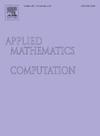Research on the resilience of reputation mechanism to the cooperative environment in the face of external shocks
IF 3.4
2区 数学
Q1 MATHEMATICS, APPLIED
引用次数: 0
Abstract
Social development is changing rapidly, and the assumed stability of the cooperative environment is only an ideal state. In the majority of prior research concerning evolutionary games, it is commonly posited that external influences are absent, thereby allowing for an exclusive examination of the system’s intrinsic evolution. However, the situation in the real world is complex, dynamic, and unstable. Therefore, this paper proposes introducing an external shock that compels a change in the rate of cooperation during the evolutionary process. This approach aims to simulate environmental changes in the real world and to observe how these changes impact the rate of cooperation. When facing external shocks, the reputation mechanism has a certain degree of recovery ability, which provides certain support for the reputation theory. This paper also adds the mechanism of learning from historical strategies to the traditional reputation model, optimizing the resilience of the reputation mechanism in the face of external shocks. Simulation results show that history learning can promote the recovery of a cooperative environment faster and more stably, short memory length strengthens the role of temptation to defect, long memory amplifies the impact of the initial state, and the joint effect of history learning rate and memory length is complex.
面对外部冲击时声誉机制对合作环境的弹性研究
社会发展瞬息万变,假设的稳定的合作环境只是一种理想状态。在大多数关于进化游戏的先前研究中,通常假设外部影响不存在,从而允许对系统内在进化进行排他检查。然而,现实世界的情况是复杂的、动态的和不稳定的。因此,本文建议在进化过程中引入外部冲击,迫使合作速率发生变化。这种方法旨在模拟现实世界中的环境变化,并观察这些变化如何影响合作的速度。在面对外部冲击时,声誉机制具有一定的恢复能力,这为声誉理论提供了一定的支撑。本文还在传统声誉模型中加入了历史策略学习机制,优化了声誉机制面对外部冲击时的弹性。仿真结果表明,历史学习能够更快更稳定地促进合作环境的恢复,短记忆长度增强了对背叛的诱惑作用,长记忆长度放大了初始状态的影响,历史学习速率和记忆长度的联合效应是复杂的。
本文章由计算机程序翻译,如有差异,请以英文原文为准。
求助全文
约1分钟内获得全文
求助全文
来源期刊
CiteScore
7.90
自引率
10.00%
发文量
755
审稿时长
36 days
期刊介绍:
Applied Mathematics and Computation addresses work at the interface between applied mathematics, numerical computation, and applications of systems – oriented ideas to the physical, biological, social, and behavioral sciences, and emphasizes papers of a computational nature focusing on new algorithms, their analysis and numerical results.
In addition to presenting research papers, Applied Mathematics and Computation publishes review articles and single–topics issues.

 求助内容:
求助内容: 应助结果提醒方式:
应助结果提醒方式:


